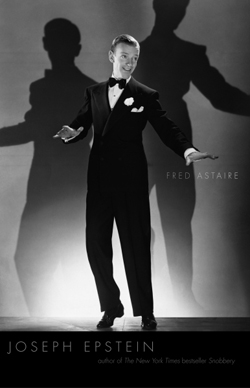Fred Astaire

The venerable and imaginative Yale University Press, which publishes a cornucopia of wonderful titles each year, including many groundbreaking art tomes (or so-called “coffee-table books”), has commissioned a series of monographs under the rubric Icons of America, of which—to give you a sense of its parameters—King’s Dream (on Dr. Martin Luther King) and The Hamburger: A History are the initial titles. Now comes “fabulous small Jew” Joseph Epstein (Snobbery and Friendship) with a splendid biographical essay on non-pareil American entertainer Fred Astaire of the manageable length (around 200 pages) that I have long championed. The work examines not only the complexities of this extraordinary dancer, singer, and movie star from a bygone era of American culture, but a keen eye for the peculiarities and resonances of an era now banally referred to as “back in the day.” As a dancer, Astaire was coupled with some of the leading hotties of the day—Cyd Charisse, Rita Hayworth, Eleanor Powell, and Betty Hutton. But no partnership was more celebrated and lauded than his complicated relationship with GingerRogers
Epstein’s great accomplishment (in addition to justifying the attention paid to another Golden Age) is reconciling Astaire’s talent for exuding elegance and grace and still being perceived as an admirable everyman. By the way, it should not go unsaid that Mr. Epstein (with whom I share a childhood upbringing in Chicago’s West Rogers Park) is a writer of great, unpretentious erudition—and thankfully boundless humor—as well as a sensible literary critic. Here’s one of his recent reviews—of Patronizing the Arts by Marjorie Garber (whose work I have, in the past, found, uh, infelicitous):
How very different from the old avant-garde—that extending from the French impressionists through Gertrude Stein, Pablo Picasso, and Arnold Schoenberg—a movement having chiefly to do with changing technique in the arts. But the avant-garde in the 1980s had turned largely political: It was about one form or another of ethnic or sexual liberation, of protest and leftwing politics. Its chief message tended to run: I’m an outraged gay or lesbian—or an angry black man, or an aging sixties radical—and I’ve had it with this detestable bleeping country, with its middle-class respectability, its vaunting of the family, its organized religions, its censorship, and hideous capitalist system. And by the way, nice to learn that I’ve been awarded an NEA grant, and when do you suppose I might receive my check?
Nicely and subtly formed argument here, yes?
